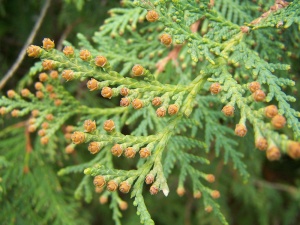Thuja occidentalis
| See Also | Botanical Monographs |
|---|
Thuja (Thuja occidentalis) is best known for its use in treating warts, yet it is also effective in a number of respiratory and genitourinary conditions. To explore the characteristics, medicinal uses and prescribing considerations of this herb in more detail, check out the references indicated.[1], [2]
Contents
Characteristics
- Common Names: Yellow cedar, Arbor vitae, Tree of life
- Family: Cupressaceae
- Habitat: Thuja is native to eastern North America, especially Canada where it prefers cold swamps and soils. It is often cultivated for a wind break.
- Parts Used: Leaf
- Constituents: Volatile oils, pinipicrin (bitter glycoside similar to quercetin), tannins
- Medicinal Actions: diuretic, genitourinary antiseptic, emmenagogue, antihelmintic, antifungal, antimicrobial, diaphoretic, expectorant,
Uses
Medicinal Uses:
Internal
- urinary incontinence, senile dribbling, enuresis in children due to infection or irritation, genitourinary catarrh, N. gonorrhea, chronic prostatitis
- fever, cough, bronchitis, aids expectoration)
Topically
- warts, condylomata, syphilitic chancre (tincture); leukorrhea, N. gonorrhea, trachoma; anal fissures, anal/rectal prolapse (use leaf); hydrocele
- warts, gangrene, ulcers, bedsores, hemorrhage from malignant growths (topical dressings)
- bronchitis, diphtheria, croup (inhale leaves, tincture, volatile oil in hot water or apply to chest)
Homeopathically this remedy is referred to as Thuja.
Prescribing Considerations
The information provided is intended to augment the treatment from a naturopathic doctor or other trained medical professional. Although most herbs are generally safe, it is recommended that you avoid self-prescribing especially when there is an underlying ongoing medical condition, if you are on any prescription medications or if you are pregnant or breastfeeding.
Formulations and Preparation
- Tincture - 1-20 drops three times daily
- Fluid extracts - 1-20 drops three times daily
- Infusion - 20-60 drops three times daily, 2-4g/cup
- Volatile oil - 1-3 drops
Safety
The safety and prescribing considerations for this herb include:[3] [4]
- Generally regarded as safe.
- Side-effects are not generally seen.
- Contraindicated in pregnancy as the herb may act as an abortifacient (increases uterine contractions).
- Drug-Herb Interactions are rare.
References
- ↑ Boon Heather, Smith Michael (2009) 55 Most Common Medicinal Herbs: The Complete Natural Medicine Guide Second Edition Institute of Naturopathic Education and Research, CCNM Toronto.
- ↑ Godfrey Anthony, Saunders Paul, Barlow Kerry, Gowan Matt (2011) Principles and Practices of Naturopathic Botanical Medicine, Advanced Botanical Medicine. V3 CCNM Press, Toronto.
- ↑ Stargrove Mitchell Bebell, Treasure Jonathan, McKee Dwight L (2008) Herb, Nutrient and Drug Interactions: Clinical Implications and Therapeutic Strategies.
- ↑ Brinker Francis (1997) Herbal Contraindications and Drug Interactions: Plus Herbal Adjuncts With Medicines, 4th Edition Eclectic Medical Publications.
